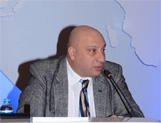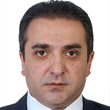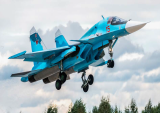
Security Trends in the Arctic Region and their Impact on Contemporary World Politics  By Nika Chitadze, PhD, Director, Center for International Studies, International Black Sea University, Tbilisi
By Nika Chitadze, PhD, Director, Center for International Studies, International Black Sea University, Tbilisi
The melting of the Arctic ice cap in combination with developments elsewhere concerning future of energy and military security are creating scenarios that range from low level friction to potential conflict between the Arctic littoral states. Much attention has been devoted to maritime boundary disputes involving the Arctic states: Canada, Denmark, Norway, Russia, and the US. In addition to this, the emerging interest of non-Arctic states in shipping, polar research and non-living resources exploitation also adds uncertain elements to the Arctic geopolitical development. READ MORE
- EGF Editor |
Published on EGF: 23.02.2019
| Security
-
Non-alignment Policy as a Principle of Shaping the National Security of Azerbaijan  By professor Sadi Sadiyev Saleh, War College of the Armed Forces, Republic of Azerbaijan
By professor Sadi Sadiyev Saleh, War College of the Armed Forces, Republic of Azerbaijan
The emergence of a bipolar world and the formation of two military blocks (NATO and the Warsaw Pact) after the Second World War ushered in an intense rivalry between different countries. Finding an effective grand strategy to survive between two hostile powers inevitably requires a balanced policy. In this context, the underdeveloped countries felt the need to join efforts for the common defence of their interests, to strengthen their independence and sovereignty and to express a strong commitment for peace by declaring themselves as “non-aligned” from either of the two nascent military blocks. READ MORE
- EGF Editor |
Published on EGF: 14.02.2019
| Security
-
Armenian-Azerbaijani Talks on Karabakh Appear Positive Even as Conflict Continues to Simmer Underneath  By Eduard Abrahamyan, Wider Black Sea & Central Asia regional security analyst
By Eduard Abrahamyan, Wider Black Sea & Central Asia regional security analyst
The foreign ministers of Armenia and Azerbaijan held four-hour-long consultations in Paris, on January 16, under the auspices of the Organization for Security and Cooperation in Europe’s (OSCE) Minsk Group. The joint statement to come out of the meeting included telling language. In particular, the two sides acknowledged the need for “concrete measures to prepare the populations for peace”. READ MORE
- EGF Editor |
Published on EGF: 14.02.2019
| Security
-
Can Major non-NATO Ally Status Temporarily Solve Georgia’s Security Dilemma?  By Eduard Abrahamyan, Wider Black Sea & Central Asia regional security analyst
By Eduard Abrahamyan, Wider Black Sea & Central Asia regional security analyst
Despite almost two decades of fanfare regarding Georgia’s pursuit to join NATO, the North Atlantic Alliance has yet to adopt a common position on the concrete timeframe of Georgia’s eventual membership. Given NATO’s protracted, uneven handling of Georgia’s enrolment process, might Georgia be better off seeking closer bilateral relations with the United States? READ MORE
- EGF Editor |
Published on EGF: 07.02.2019
| Security
-
Withdrawal of the US Troops from Syria and its Impact on the Security Environment in the Black Sea Region  By Nika Chitadze, PhD, Director, Center for International Studies, International Black Sea University, Tbilisi
By Nika Chitadze, PhD, Director, Center for International Studies, International Black Sea University, Tbilisi
As it is known, US President Donald Trump recently adopted a decision on the withdrawal of about two thousands American military serviceman from Syria. It is possible that one of the main purposes of the American contingent’s withdrawal is the restoration of closer relations between USA and Turkey and the prevention of strengthening cooperation between Moscow and Ankara. READ MORE
- EGF Editor |
Published on EGF: 28.01.2019
| Security
-
Uncertainties and Weaknesses in International Security Around the Black Sea Region  By Eugene Kogan, Tbilisi-based defence and security expert
By Eugene Kogan, Tbilisi-based defence and security expert
It can be ascertained that until the Russian illegal annexation of Crimea, in March 2014, the Black Sea Region was perceived as a region with certain problems, but certainly not of a military nature. As a result, this region was neither high on the international community agenda nor on the radar screen of the NATO member states, and that despite membership of Bulgaria, Romania and Turkey in NATO. Furthermore, Prime Minister Recep Tayyip Erdogan and his government thought back in 2014 that they were capable to handle President Vladimir Putin’s Russia single-handed, NATO assistance was not required, and non-NATO members such as Georgia and Ukraine should not be involved. READ MORE
- EGF Editor |
Published on EGF: 24.01.2019
| Security
-
Ceasefire Violations Down as Armenia and Azerbaijan Implement South Caucasus Study Group Recommendation By EGF Editorial Staff
Since the end of October 2018, a new operative communication line (crisis hotline) has been established between Armenia and Azerbaijan, two countries that have been at war over the status of Nagorno-Karabakh (NK), a region recognized as Azerbaijani by the International Community, but inhabited by a majority Armenian population.
According to official sources from both sides, the level of military tension on the Line of Contact (LoC) between the conflicting parties has significantly decreased (from about 90 reports of ceasefire breaches/day, to about 20 reports/day). The opening of this new communication channel had been agreed several weeks before by the president of Azerbaijan, Ilham Aliyev, and the Prime-Minister of Armenia, Nikol Pashinyan, during an informal meeting held in the margins of the CIS summit in Dushanbe (Tajikistan) on 27-28 September 2018. READ MORE
- EGF Editor |
Published on EGF: 11.12.2018
| Security
-
Armenia’s Unique Geopolitical Reality: An Asset for NATO’s Stability Projection Southwards  By Vahagn AFYAN, Deputy head of Mission, Embassy of the Republic of Armenia to Poland
By Vahagn AFYAN, Deputy head of Mission, Embassy of the Republic of Armenia to Poland
How can Armenia’s geopolitical context contribute to stability in its immediate vicinity and in NATO’s Southern Neighbourhood?
This paper will consider Armenia’s geopolitical location from the perspective of NATO’s Southern neighbourhood and examine its cohesion, dependability and potential contribution to NATO’s intended task of projecting stability. With regard to NATO and its relationship with Armenia, the first step is to create a better understanding of the particularities of the country and its policy. Increased knowledge of the ongoing integration processes affecting various political, economic and military aspects, as well as internal political developments, will allow a full exploration of the potential for strategic partnership between the Alliance and Armenia. READ MORE
- EGF Editor |
Published on EGF: 18.09.2018
| Security
-
Russia’s Policy of Deception and Denial By Eugene Kogan, Tbilisi-based defence and security expert
A policy of deception and denial is the cornerstone of Russia‘s overarching strategy of confusion, paralysis and ultimately defeat of the opponent.
Consistency, conviction and perseverance are key words to describe the policy of deception and denial. The cases presented below shed light on the consistent pattern of President Vladimir Putin’s government to deceive others and depict Russia as the one that comes to the aid of the underdogs, whether in Georgia, Ukraine or elsewhere. Syria is a special case where Russia cannot abandon its military bases to aggressive Western powers. READ MORE
- EGF Editor |
Published on EGF: 10.09.2018
| Security
-
Russian Aerospace Forces and the Syria Campaign: An Assessment  By Eugene Kogan, Tbilisi-based defence and security expert
By Eugene Kogan, Tbilisi-based defence and security expert
There is no doubt whatsoever that the lion’s share of the Russian defence budget funds for the years 2011–20 was allocated to the Aerospace Forces (VKS – Vozdushno-Kosmicheskiye Sily) namely, RUR4 trillion out of total RUR19 trillion 1 (or 21 per cent of budget sum US$ 337 billion). The level of financial allocations clearly highlighted the armed forces priority in the eyes of President Vladimir Putin and the top military brass. The forces proved to be a crucial tool in the hands of President Putin and the military establishment. And the VKS continue to play an important role in President Putin’s overall military strategy in particular after a successful operation in Syria. READ MORE
- EGF Editor |
Published on EGF: 28.05.2018
| Security
-
